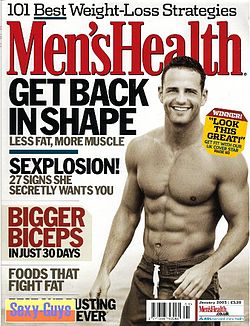- Men's Health (British magazine)
-
Men's Health 
Graeme Peacock on the January 2003 coverEditor Morgan Rees Categories Health
lifestyle
nutrition
fitnessFrequency Monthly Circulation 250.000 (2009) (UK) Publisher Rodale Press First issue 1995 Country United Kingdom Based in London, England Language English Website MensHealth.co.uk ISSN 1356-7438 Men's Health (MH) is the British edition of the American magazine Men's Health. The British magazine was launched in February 1995 with a separate editorial team and is now the best-selling monthly men's magazine in the United Kingdom,[1] more than GQ and Esquire put together. The magazine focuses on topics such as fitness, sex, relationships, health, weight loss, nutrition, fashion, technology and style. The currently editor-in-chief is Morgan Rees; Toby Wiseman is the featured editor.
The UK version has maintained the image of the original U.S. version, in particular by promoting the body care, nutrition and all matters relating to the male universe. The concept of aesthetically perfect man is an extreme with the presence on cover of bare-chested muscular male models.[citation needed] Because of these reasons, the magazine was often criticized for promoting an unattainable model of man. To further strengthen the idea of achievability, the staff of the magazine often try out the health and fitness programs themselves and write about their experiences alongside pictorial evidence. In March 2006, one of the UK writers, Dan Rookwood, appeared on the cover of Men's Health having transformed his body shape while working at the magazine. The staff of German Men's Health have also appeared on their cover,[citation needed] and UK fitness editor Ray Klerck has appeared on the cover as well as within the pages of the magazine as a model.
Contents
Cover models
Since the first issue, on the cover of the magazine are always appeared bare-chested muscular American male models and personal trainers like Tom Cortesi, Scott King, Jack Guy, Jim Buol, Gregg Avedon, Russell Brown, Owen McKibbin, Rick Dietz, Bradly Tomberlin, Rick Arango and many others.[citation needed] In 2002, the UK edition started what became a yearly competition in order to find a Men's Health reader with a body seen fit to front the magazine in the hopes that the image of a British "normal guy" will spur other Men's Health readers to obtain the 'look' and also remind them that this kind of physique is obtainable.[2]
The first winner of the UK Cover Model search was 22 year old Graeme Peacock,[3] who secured a sponsorship contract with supplement manufacturer Maximuscle. There was no contest in 2003, but in 2004 the contest went annual, with the second winner being Neil Laverty, now represented by Compton Model Agency. Winners of the UK Cover Model competitions for 2005 were Ollie Foster (United Kingdom) and Manuel Mera (Spain). In 2006, 21 year old Mike Fawkes won the 2006 UK Cover Model competition. In 2007 win Chris Whitlow, in 2008 the Cover Model competition winner was Kevin Goodwin, in 2009 win the 29 year old James Bayntun,[4] in 2010 win Kirk Miller.[citation needed] In recent years have appeared on the cover also celebrities such as Jason Statham, Rusty Joiner, Ryan Reynolds, Josh Holloway, Marco Dapper, Gerard Butler, Vin Diesel, Joe Manganiello and Cristiano Ronaldo.[citation needed]
Cycling team
In 1999, Men's Health sponsored a British UCI Division 3 professional cycle racing team, the team's Director Sportif was Sid Barras, himself a former professional cyclist. Although the team achieved numerous successes during the year, sponsorship was not renewed in 2000. Team members included welshmen Matt Beckett and Huw Pritchard, a medal winning Commonwealth Games competitor.
Criticism
The content of the U.S. version of Men's Health in the year 2000 was analysed in Stibbe (2004).[5] The findings of this research suggested that Men's Health magazine at the time gave some useful health advice but included images of masculinity which were counter-productive for health promotion. In particular, the form of hegemonic masculinity promoted by the magazine had the potential to promote negative health behaviours such as excess alcohol consumption, excess meat consumption, reliance on convenience food, unsafe sex, and aggressive behavior.[citation needed] The scope of this study did not include how the content of the magazine has changed over time, or how the content of the UK version differs from the U.S. version.
The UK version received strong criticism from Psychologist Dr David Giles from the University of Winchester because of its promotion of a muscular physique as a sign of health.
"The message in typical lads' magazines is that you need to develop a muscular physique in order to attract a quality mate. "Readers internalise this message, which creates anxieties about their actual bodies and leads to increasingly desperate attempts to modify them."[6]
This magazine, among others has also been linked as a leading cause of a type of Body Dysmorphic Disorder called "athletica nervosa".
See also
- Masculinity
- List of men's magazines
- Men's health risks
References
External links
Spin offs Categories:- Men's Health (magazine)
- Rodale, Inc.
- Magazines established in 1995
- British men's magazines
- British fashion magazines
- British lifestyle magazines
- Fitness magazines
- Health magazines
- Monthly magazines
Wikimedia Foundation. 2010.
